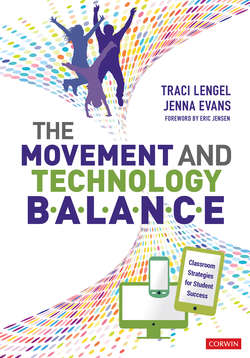Читать книгу The Movement and Technology Balance - Traci Lengel - Страница 21
На сайте Литреса книга снята с продажи.
The Impact on Learning
ОглавлениеThe evolution of technology has and will continue to impact our schools, teachers, and students. In Chapter 6, we will evaluate the role it plays in your own life. We will ask if you are addicted to your cell phone, television, texting, gaming, or Facebook. You will be encouraged to consider how much time you spend using technology and whether you place limits on yourself. Technological advancements have brought convenience, entertainment, and opportunities for socialization to us with the click of a button—but at what cost? Some people are always viewing special moments in life through a lens on their phone, camera, or iPad. Sure, there is something to be said about capturing a significant event in a picture or video. However, some would argue that viewing an entire concert through a lens really isn’t worth it. It is questionable whether we are enjoying the production to its fullest extent. The beauty of the sounds being sung might not be heard, and our attention might instead be on whether or not the camera is focused and centered. Are you one of these people? If you realize that you are addicted to technology, you may be able to see how this can affect your teaching and maybe even your content delivery. In this book, you will be encouraged to evaluate your own life choices in regard to your digital usage. It will be difficult for you to reverse the current direction of our society if you are also following a destructive path and are not willing to change. Life is meant to be about growth, change, and redirection. Sometimes, the redirection takes us back to a time in life when our values were more in line with a happier, healthier individual or to a childhood filled with great memories of play, physical activity, and face-to-face time with friends. There is also something to be said about looking for balance in life (and in classrooms) while providing the effort to sustain it.
Consider how students have been affected by technology and how their learning, attention, or focuses have been influenced. Their priorities and interests have shifted as a result of digital advancement, and schools should take action to ensure that technology plays a significant role in learning but is not overused. Schools will need to provide support to students who suffer from addictions related to their devices or depression that is connected to social media. Excessive technology dependency is a serious concern in our current culture. We must evaluate our choices, priorities, and behaviors to determine if we are acting in our best interest. As an educator, you are the leader of your classroom or school and can determine how it functions and proceeds. You can deliver your content in a manner that fits learners’ needs yet stretches them outside their comfort level to build stronger humanitarians. Without question, technology has its value. However, it can—and is—being overused in many instances.
Schools will be urged to incorporate policies and limits on cell phone usage, if these are not already in place. If students are using their phones throughout their class for personal means, even though they are instructed not to, this is an educational concern. Cellular usage is a difficult gray area. We want children to have phones for safety and educational purposes, but addiction can consume their thoughts and distract them from the very purpose you intended them to have. Education and self-management on healthy digital usage needs to be a top priority in classrooms and home environments. We must look for learning, social, and entertainment outlets for our youngsters that do not include technology. Physical activity, exercise, and active teaching techniques should be first on our list. These experiences will allow for social, physical, mental/emotional, and cognitive development that many children are presently lacking.
